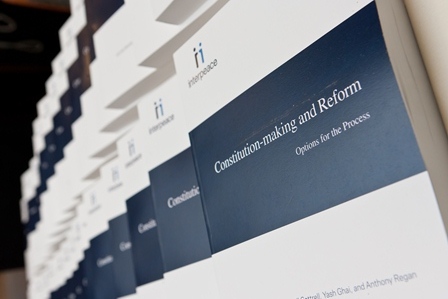Spotlight on constitutions: Defining the foundations of a state

Today, Monday, 17 September 2012, marks the 225th anniversary of the constitution of the United States of America. More globally, Constitution Day reminds us of the important role constitutions play all over the world. Constitutions lay the foundations for how a state is governed. The design, implementation and management of constitution-making processes, in an inclusive way, can create the basis for lasting peace. At the same time, if the process of designing a constitution is flawed or in situations when key stakeholders are excluded, the seeds of future conflict and violence might be sown.
Over 150 new constitutions have been created since 1975, and as many as 20 national constitutions are reformed or adopted each year. The ‘Arab Spring’ reflects the evolution of this trend. Since 2011, constitutional reforms have been, or are, on the agenda in Tunisia, Egypt, Morocco, Nepal, Southern Sudan, Zimbabwe and Libya, amongst others.
Interpeace’s constitution-making handbook
A modern constitution needs to be legitimate in the eyes of the people – with participation being critical to this legitimacy. However, achieving an inclusive process is not intuitive. Interpeace filled a critical gap in 2011 with its handbook ‘Constitution-making and Reform: Options for the Process’ in highlighting avenues and providing guidance for such processes.
The book’s relevance reaches far beyond those that are traditionally involved in constitution-making. “Members of constituent assemblies or constitutional commissions, government officials, politicians, civil society, activists, donors, foreign advisors, policy analysts, academics, and international aid actors can all benefit. It captures the knowledge and weighs up the options so they can make up their own minds on what will work best for their society,” highlights Scott M. Weber, Director-General of Interpeace.
Special attention is given to the needs of practitioners undertaking a constitution-making process in a conflict or post-conflict country. Divided societies face unique challenges in achieving a consensus-based constitution-making process.
Practical guidance on the options available in the constitution-making process
The handbook provides practical guidance on how to design transparent, nationally led and owned processes that are also participatory and inclusive.
“With the complexity of a constitution-making process come difficult choices. The handbook lays out the potential dilemmas and implications that practitioners on the ground may face,” explains Graeme Simpson, Director of Policy and Learning.
Graeme confirms how Interpeace approached this initiative: “Much of the knowledge contained in the handbook simply did not exist in publications. Experiences needed to be harnessed.”
‘Constitution-making and Reform: Options for the Process’ draws from the first-hand knowledge of more than 120 practitioners and experiences from over 100 countries. Furthermore, the four authors – Michele Brandt, Jill Cottrell, Yash Ghai and Anthony Regan – together bring more than 90 years of experience working on constitutional processes.
Handbook available in English and Arabic – translations into Vietnamese and French under way
The constitution-making handbook is currently available in English and Arabic, while translations into Vietnamese and French are under way.























